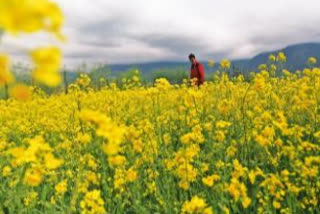New Delhi:The Swadeshi Jagran Manch on Friday opposed a regulatory body's recommendation for the environmental release of genetically modified mustard, calling it "dangerous" and urged the Centre to ensure that the crop's seed is not allowed to be planted "now or ever".
In a letter to Union Environment Minister Bhupender Yadav, the RSS-affiliated organization accused the Genetic Engineering Appraisal Committee (GEAC) of functioning in an "irresponsible fashion" and said the claims made in support of genetically modified (GM) mustard were "completely untrue, unsubstantiated and wrongly projected".
"Swadeshi Jagran Manch has all along been opposing this dangerous and unneeded GM mustard being brought in through the backdoor as a public sector (genetically modified organism (GMO)," Swadeshi Jagran Manch co-convenor Ashwani Mahajan said in the letter.
The ministry had earlier kept the regulatory clearance for the operationalization of the recommendation made in favor of GM mustard in abeyance to seek a review after the Swadeshi Jagran Manch raised "key issues" of concern.
However, the GEAC "predictably" did not take up any review "worth the name", Mahajan said. "The regulators are joining hands with GM crop developers and are time and again compromising the regulatory regime quite seriously, and they have done so with this GM mustard also," he charged in his letter.
"We are confident that as a person who has carefully studied the adverse impacts of GM crops and also published opinion pieces on the same in the past, you will intervene immediately in this matter, and ensure that no GM mustard seed is allowed to be planted, now or ever," Mahajan added in his letter to Yadav.
Raising objections to the regulatory body's recommendation, the Swadeshi Jagran Manch co-convenor termed as "completely untrue" the claim that GM mustard was 'swadeshi' and had been developed in India.
"We would like to bring it to your kind notice that in 2002, Proagro Seed Company (Bayer's subsidiary), applied for commercial approval for a similar construct that Prof Pental and his team are now promoting as HT Mustard DMH 11," he said.
Mahajan was referring to scientist Deepak Pental, whose GM mustard technology has been approved by the GEAC. Bayer's application at that point was turned down because the Indian Council of Agricultural Research (ICAR) said their field trials did not offer evidence of superior yield, he underlined.
It is "well known" that hybridization of GM mustard is achieved by means of two genes barnase and barstar, derived from a soil bacterium called Bacillus amyloliquefaciens, Mahajan said. The bar-barstar-barnase gene is a patented technology of Bayer Crop Science, he said.
